































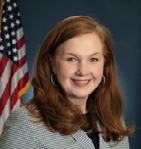



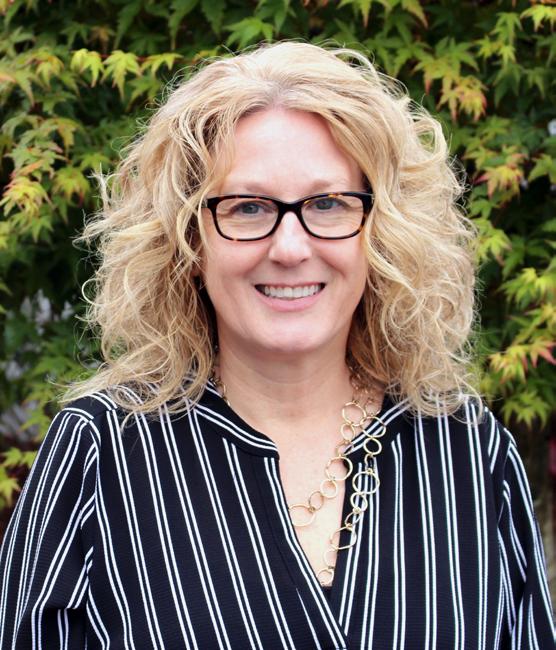

In communities across the nation, Adult Protective Services (APS) play a vital role in safeguarding the well-being and rights of our most vulnerable populations. This essential service not only protects individuals from abuse, neglect, and exploitation but also provides a lifeline of support and advocacy that ensures their dignity and quality of life. Let’s celebrate the tireless efforts of APS staff, allies, and the advocates across the nation who champion this cause.
Advocacy is at the heart of APS’s mission. Advocates work tirelessly to raise awareness about the issues facing vulnerable adults and to promote policies that protect their rights. Their efforts include:
1. Policy Advocacy: By influencing legislation and public policy, advocates help shape a safer and more supportive environment for vulnerable adults. This includes lobbying for stronger protections, better funding for APS programs, and improved community resources.
2. Community Outreach: Education and awareness campaigns are crucial in preventing abuse and neglect. Advocates work within communities to provide information about the signs of abuse, how to report it, and the resources available to those in need.
3. Direct Service: Many advocates are directly involved in providing services to vulnerable adults. This can include offering legal assistance, social services, mental health services, and more.
The impact of APS advocacy is best illustrated through success stories from across the nation. Here are a few examples highlighted at the National Adult Protective Services Association Success Stories.
The success of APS advocacy relies heavily on community support. It is through the collective efforts of community partners, organizations, and government entities that meaningful change can occur. Communities can support APS by educating and spreading awareness about the importance of APS and the resources available.
As we celebrate the achievements of APS advocacy, it is important to recognize the ongoing challenges and the need for continued support. The aging population and increasing reports of abuse highlight the necessity for robust APS programs and dedicated advocacy efforts.
In conclusion, the advocacy of Adult Protective Services across the nation is a testament to the power of compassion and dedication. By protecting the rights and well-being of vulnerable adults, APS staff and advocates ensure that every individual can live with dignity and respect. Let us continue to support and celebrate their invaluable contributions to our communities.

Bethhas 16 years of state service. She has worked for APS for nearly 5 years and as a supervisor within the APS Intake Unit. Prior to APS she worked for the Juvenile Rehabilitation Administration and decided to come to APS after hearing about the great opportunities within the agency.
Beth loves being able to help the vulnerable population and encouraging growth within the Intake Unit. Her favorite parts of the job include being able to communicate with intake staff daily, and analyzing allegations in complex cases.
Her most influential mentor is her dad who instilled that with hard work and understanding, there is no ceiling. He too worked for the state, having received numerous awards (including being only one of two officers to earn the Statewide Officer of the Year award twice).
During Beth’s free time, she enjoys time with her family, her 4 rescue pups, watching basketball (go Storm!), volleyball, and cooking.
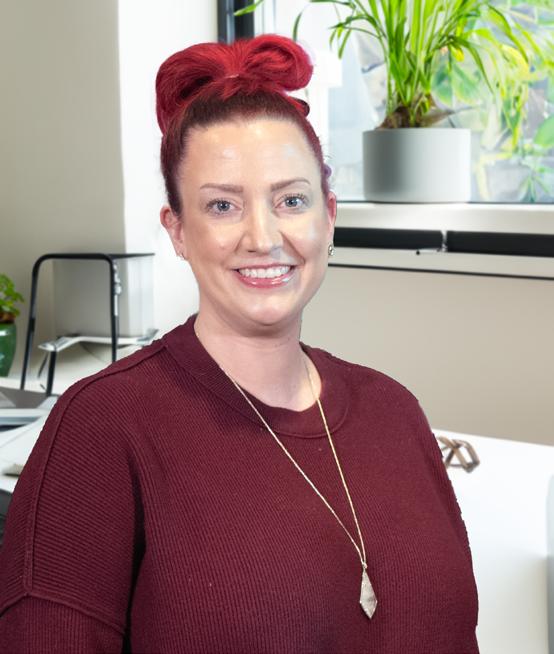

Washington is a treasure trove of natural beauty and outdoor activities, perfect for anyone looking to explore and enjoy the great outdoors this summer. There is something for everyone, from lush forests and serene lakes to stunning mountains and sprawling coastlines. Whether you’re seeking adventure, relaxation, or just a breath of fresh air, I hope that you make the most of your summer in Washington State, with a particular focus on accessibility and inclusion for vulnerable adults.
Washington offers many hiking trails and nature walks that cater to all skill levels. For those who enjoy a brisk hike or a stroll, the state’s parks and trails provide a perfect escape from the hustle and bustle of daily life.
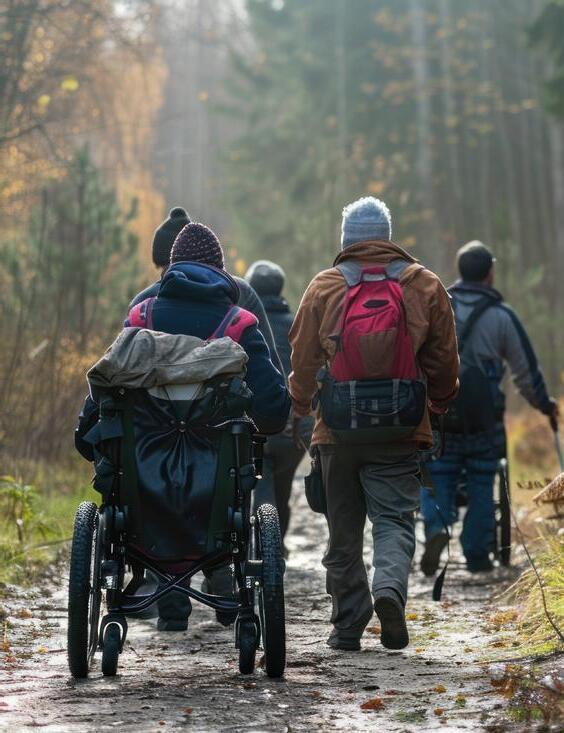
Recommendations:
Beginner-Friendly Trails: Many parks offer well-maintained, flat trails perfect for beginners and those with mobility challenges. These trails often feature benches and rest areas, making them ideal for anyone needing frequent breaks.
Accessible Trails: Look for ADA-compliant trails, ensuring they are wheelchair accessible and suitable for individuals with limited mobility. Trails with smooth surfaces and gentle gradients provide an excellent opportunity for everyone to enjoy nature.
Guided Nature Walks: Consider joining a guided nature walk. These walks are usually led by knowledgeable guides who can offer insights into the local flora and fauna, enhancing the experience for everyone, including vulnerable adults who may benefit from a more structured outing.
Washington’s numerous lakes, rivers, and coastlines make it a prime location for water-based activities. Whether you prefer a calm paddle or the thrill of sailing, there’s something for everyone.

Recommendations:
Kayaking and Canoeing: For those seeking a peaceful experience on the water, kayaking or canoeing is a great option. Many rental locations offer stable, easy-to-enter kayaks and canoes; some even provide adaptive equipment for individuals with physical disabilities.
Accessible Boating: Look for boating companies that offer accessible vessels and equipment. These services often include ramps, lifts, and other accommodations to ensure everyone can safely enjoy the water, including those with mobility challenges.
Fishing: Fishing is another fantastic water activity that can be enjoyed from the shore or accessible fishing piers. Many state parks offer fishing equipment rentals and have designated accessible fishing spots, making it an excellent activity for all ages and abilities.
Camping and picnicking are timeless summer activities that allow you to immerse yourself in Washington’s natural beauty. Whether pitching a tent in the wilderness or enjoying a family picnic in a park, these activities offer a perfect blend of adventure and relaxation.

Recommendations:
Accessible Campgrounds: Many campgrounds in Washington State are designed with accessibility in mind. Look for campgrounds that offer accessible campsites, which typically feature level ground, accessible restrooms, and nearby parking.
Picnic Areas: For a more leisurely outing, consider visiting one of the many parks with accessible picnic areas. These areas often include picnic tables that accommodate wheelchairs, paved paths, and accessible restrooms, making them perfect for a day out with friends and family.
Adaptive Camping Gear: For those who require additional support, adaptive camping gear such as accessible tents, sleeping cots, and camping chairs can make the experience more comfortable and enjoyable.
Learning something new in the great outdoors can be a rewarding and refreshing experience. Washington State offers a variety of outdoor classes and workshops that cater to diverse interests and abilities.

Recommendations:
Outdoor Yoga and Fitness Classes: Many parks host outdoor yoga and fitness classes that are inclusive and welcoming to individuals of all fitness levels. These classes often offer modifications to accommodate different abilities and ensure everyone can participate.
Nature and Wildlife Workshops: Participate in educational workshops focused on nature and wildlife. These workshops are typically accessible and offer hands-on learning experiences suitable for all ages and abilities.
Gardening Workshops: Community gardens and parks often host gardening workshops, which provide therapeutic and educational outdoor activities. These workshops are usually designed to be inclusive, making them a great option for vulnerable adults who may enjoy a slower-paced, calming activity.
Washington State’s diverse landscapes and commitment to accessibility make it an ideal destination for summer adventures. By exploring the state’s trails, waters, and parks, you can create lasting memories while ensuring everyone can enjoy the beauty and serenity of the great outdoors, regardless of their abilities. So, pack your bags, grab your sunscreen, and get ready to explore the wonders of Washington this summer!
Click below to discover some great sites to help get you started!
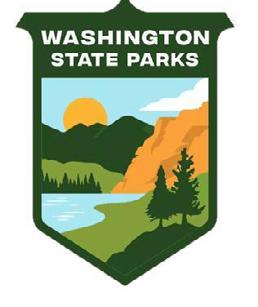
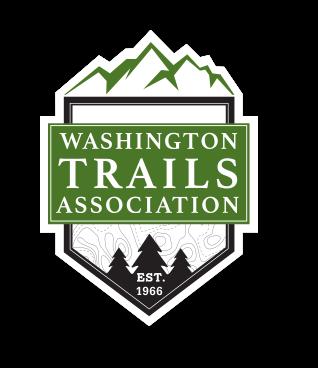
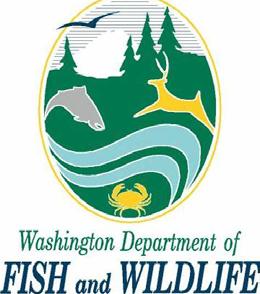
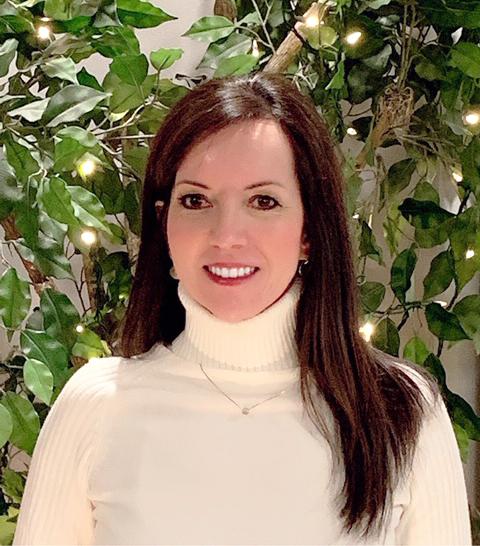
Paula Hughes, M.Ed., CDE Deputy Director WA State Adult Protective Services

Rena Albertson is a lifelong learner, always aspiring to increase her knowledge and grow both professionally and personally. Much of Rena’s career was focused on her professional development while training and supporting others on their own professional journey. Since 2013, Rena has held four different roles within APS. When the opportunity to work with APS presented itself, Rena was excited and inspired. The mission of APS resonates strongly with her aligning with her personal values. She loves solving puzzles and helping people, making it a natural fit. Rena became an APS Investigator in 2013, where she immediately fell in love with the investigative work, helping vulnerable adults, and holding perpetrators accountable. In 2014, Rena became an APS Supervisor where she learned more about the program, how to navigate relationships with staff from a supervisory perspective, while committed to training, coaching, and supporting them.
Getting back to her training roots, Rena moved into the APS SHPC role in 2018. She loved the focus of supporting investigators with one-to-one training, curriculum development, and working directly with APS Headquarters to create and facilitate APS Academy. In 2022 Rena filled the program manager position that oversaw the Union Gap, Kennewick, and Walla Walla/Clarkston offices. Rena took on the challenge, traveling from her home base in Spokane. She invested her time and energy into the job, providing much needed stability and consistent direction during a time of change and flux.
While Rena loved the job (and will miss working with her team!), she believes that the focus and hard work of all the staff in that area have paid off, allowing her the opportunity to move to a supervisor position closer to home. Rena is excited for the opportunity to build a new team, incorporating all she has learned, and create a better work/life balance for herself. It allows her to spend more time with her husband, four adult children, two grandchildren (Charlie (age 1) and Sam (age 6)), her three dogs (Bosco, Larry, and Bella), and her interests of gardening, reading, camping, and spending time at her family homestead in Montana. While Rena plans to continue her own professional growth, she has committed the last stretch of her career to APS
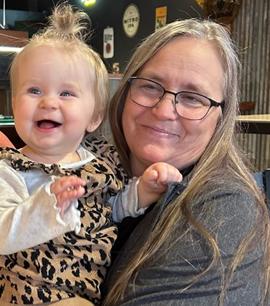



and plans to continue on her journey here until retirement.
Sydney Victor started with APS in 2018 as an SSS3 in the Holgate office. Her thorough investigations stood out immediately and worked hard to obtain protective services for vulnerable adults. She promoted to an SSS4 in 2023 and showed her strength as a mentor and trainer to new investigators. Sydney demonstrates diplomacy, honesty, and empathy with those she works with. New employees have stated that Sydney makes them feel supported and sure of their abilities to independently conduct investigations after being trained by her. Supervisors feel like they have a partner in the training process and request that Sydney work with their employees. She has an eye for detail and frequently catches items that are missed.
Sydney has taken on the role as the liaison to the Muckleshoot Tribe and worked hard at developing a trusting relationship with the tribe and their Elders. When asked to take on this role, she did so without hesitation, which is just one example of her willingness to take on new tasks and challenges. She enjoys crafts, yoga, cooking tasty meals, and exploring Seattle parks with her dog.
Andy Page, Social Services Specialist 5, is a valued member of the Region 3 Management Team. He assisted with two high-profile cases where he took immediate actions by completing face to face contacts, connected with collateral contacts, coordinated with partnering agencies and put protective services in place. His actions addressed the emergent needs of the vulnerable adult and initiated actions against the alleged perpetrator to prevent any future mistreatment. While working the cases, Andy used the opportunity for teachable moments with some of his unit investigators by having them shadow his field visits to observe his interactions with the alleged victim, alleged perpetrators and collateral contacts. They learned firsthand about community resources, protective services and ultimately justice for the alleged victim and their family.
His involvement with these cases highlight Andy’s many strengths as a leader. His unit and the region are fortunate to have such a dependable, inspiring, and knowledgeable management team member.

APS Enhanced Academy officially launched in May 2024!
The Academy Enhancement Project lasted over a year. It was led by the APS HQ Training Team in close partnership and collaboration with regional SHPCs, the Policy Team, and the Legal & Records Team.
How is the new curriculum structured?
The enhanced curriculum consists of seven models:
Module 101 APS Overview and Definitions
Module 102 Intake Training
Module 103 Documentation Principles and Investigation Planning
Module 104 Interviewing, Evidence Gathering and Protective Services
Module 105 Forensic Interviewing
Module 106 Short Portable Assessment of Capacity for Everyday Decision-Making (SPACED)
Module 107 Findings, Dispositions and Due Process
The order of these modules follows the process of APS investigations, with a break of one to two weeks between adjacent modules. As learners navigate through the training, they will learn the important definitions, processes and best practices related to APS work as well as engage in various hands-on field practices.

Each module contains pre-requisite activities, instructor-led classroom learning, and post-module activities. Learners must complete all pre-requisite activities prior to registering for the classroom session.
• Pre-requisite activities: Activities and e-learnings provide learners the basic concepts and knowledge to facilitate their learning of the module content.
• Instructor-led classroom learning: Interactive and engaging classroom sessions delivered remotely or in-person.
• Post-module activities: Field work and other activities to help learners acquire hands-on skills through experience with real cases.
It may take about two to three months for staff to complete all seven modules of the curriculum. After completion of the academy training, participants will have a solid knowledge of APS work and strong skills for conducting field investigations.
The new academy curriculum comes with exciting improvements over the 4-week training. Key enhancement features include:
• Clearly defined learning objectives in each module.
• Reorganization of content to match the flow of APS investigations.
• Alignment with adult learning theory to best support experiential learning and critical thinking.
• Integration of forensic interviewing language throughout the curriculum.
• Engaging and interactive classroom learning.
• Mix of field activities and in-class learning.
• Integration of EDAI values and principles.
• New content on working with diverse cultures, cultural humility and competence.
The Academy Enhancement Project was a collaborative effort between the APS HQ Training Team and many other teams, offices, and individuals within APS as well as throughout ALTSA and DSHS. The APS Training Team would like to thank the following for their help and support: ALTSA Organizational Development, APS Executive Leadership Team, APS Legal & Records Unit, APS Outreach and Engagement Unit, APS Policy Unit, APS regional SHPCs, DSHS Office of Indian Policy, and the UW Alliance for Professional Development, Training, and Caregiver Excellence. Special thanks go to Claire Knight (PEAR Strategic Alignment Administrator) for her insights into EDAI principles and best practices for curriculum design and training delivery, Collin May (ALTSA Training, Performance, & Operations Project Manager) for his generous help with curriculum build in the Learning Center, and Crissy Smith (HCS eLearning Developer) for technical assistance with the Safety Screening Articulate e-learning.

submitted by
Claire Knight PEAR Strategic Alignment Administrator
As a leader and creator of our Cultural Community Onboarding, I guide participants through a values exercise where everyone pinpoints their most important values and how these are recognized in the work of APS. I am moved when I see the connections that exist in our purpose and the “why” behind our choices to remain in this work. Most people speak of the joy in helping others, the value in having impact, and the ability to give back to their communities.
How then is it that conflict is so prevalent when so many of us connect to this work in our core values, our very “why” behind doing this work? Here’s why: Conflict is a part of the human experience. The moment we accept this, quit avoiding conflict, nurture the courage to kindly address it, and work towards resolution, the quicker we can reallocate that energy to other meaningful tasks and a happier, more peaceful reality. Not just at work, but in life.
Merriam Webster defines conflict as: Mental struggle resulting from incompatible or opposing needs, drives, wishes, or external or internal demands.
Read that again…let me read that again. My response to this definition – so what? Thinking “so what” gives me the freedom to move beyond simply engaging emotionally based on our differing perspectives, to considering where some middle ground might exist. “So what” propels me to ask you to tell me more so that I can understand your perspective. I’ve found that these kinds of connections often lead to growth through learning.
I was recently leading a session where a participant commented on the impact that changing your mindset can have on the behavior and actions of
others. This brave, bold participant noted that when a DSHS customer is being antagonistic with them, they adjust their mindset and incorporate thoughts on the other person’s possible perspective causing their behavior changes, leading to the customer adjusting their behavior as well resulting with a calmer interaction. That is EDAI in action: Pause, consider the diversity of experience, empathize, stimulate a more inclusive interaction.
There are many examples that come to mind where I see EDAI in action in our work. What about you?
Here are some applications to bear in mind:
When conflict rears its head, pause to consider the fairness of all perspectives. Be open to the possibility that you are not being fair.
Remember that there is perhaps more diversity among us than we can name. That diversity includes diversity of thought, which is impacted by so many factors and is often unconscious (yep, yours, too!).
Consider what barriers you might be erecting to collaboration and connection. What story might you be telling yourself that is affecting how you interact? What if your story is not factual?
Remember the disarming and inviting effect that simple requests such as, “Tell me more” or “Share your thoughts with me so I understand” can have on others.

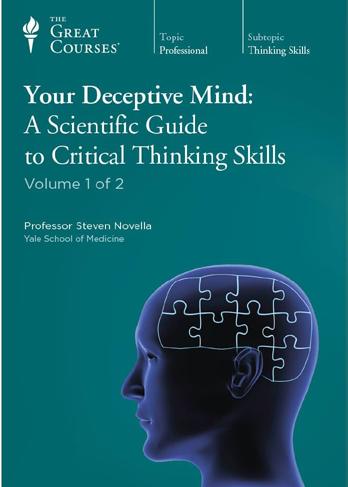
YOUR DECEPTIVE MIND: A SCIENTIFIC GUIDE TO CRITICAL THINKING SKILLS
by Steven Novella
“Great listen for any APS investigator. With inundation of information, he shares how we can practice metacognition and looking at our biases, to look at information more critically.”
- Reviewed by Paula Hughes
The key to successful critical thinking lies in understanding the neuroscience behind how our thinking works - and goes wrong; avoiding common pitfalls and errors in thinking, such as logical fallacies and biases; and knowing how to distinguish good science from pseudoscience. Professor Novella tackles these issues and more, exploring how the (often unfamiliar) ways in which our brains are hardwired can distract and prevent us from getting to the truth of a particular matter. Along the way, he provides you with a critical toolbox that you can use to better assess the quality of information. Even though the world is becoming more and more saturated with information, you can take the initiative and become better prepared to make sense of it all with this intriguing read.
DISCLAIMER: The views and content expressed in the recommendations provided do not necessarily reflect those of our organization. We encourage readers to use their own judgment and discretion when considering and implementing any advice or suggestions offered.
Expand your horizons with a thoughtfully curated reading list focused on equity, diversity, access, and inclusion, empowering you to embrace varied perspectives and foster a more inclusive and equitable society.

HOW THE WORD IS PASSED: A RECKONING WITH THE HISTORY OF SLAVERY ACROSS AMERICA by Clint Smith
“This great book delves into the legacy of slavery and how this has impacted America and American history. Very thought provoking, moving, with moments of levity.”
- Reviewed by Paula Hughes
How the Word Is Passed presents the history of the American culture with black communities at its center. From its origins of slavery and racial inferiority to its current state of theoretical equality, this racial group faced all sorts of limitations that are still very much actual even today.
The book takes the readers through nine historical sites popular for black history and educates them on the power of racial injustice, its negative effects on human morale and development, and how history can easily repeat itself if we’re not paying attention to it.
Do you have a book or media recommendation to enhance and support EDAI awareness and/ or the APS workforce?
We’d love to review, share, and publish them in future issues of our newsletter!
Send a short review, title, and author to: jesse.dixon@dshs.wa.gov

Exciting new features have been added with the latest TIVA2 release. Many suggestions came from the 2023 TIVA2 Workshop or submitted by staff to help us improve the system. Below are the highlights of the latest release to improving the intake and investigative process better:
• Associating case notes with participants: As we want to ensure a thorough investigation, it is important to have some verification that staff have spoken to every alleged victim, alleged perpetrator, collateral, and/or reporter. TIVA2 case notes now allow for staff to select specific participants to associate with case notes and verifies if a case note has been entered for each participant listed.
• Removing extraneous person records: During business, person records are occasionally created without any intakes or investigations associated with them. Excess person records slow down search results, don’t add value and can lead to linking to the incorrect person. If these persons are not from CARE, STARS, TIVA legacy, registry entries or from other APS and RCS work, a nightly batch will run to remove them from the TIVA2/STARS system.
• Adding the person ID to person management and search: Every person in TIVA2 has an ID associated with them. Historically this ID has been in the background will be listed on their person records and display in searches. This will allow staff to know when the person listed in search is the same or a different person and to clearly identify people with similar names and demographics.
• Links to frequently used applications and sites: The TIVA2 dashboard now has an external links section to direct you to items you frequently use such as the Investigator Power BI Dashboard, CARE Web and more!

If you have ideas on TIVA2 system improvements, please suggest them to your SHPC team!

Trainers: APS Operations & Data Specialists, Dave Beacham and Sajan Karki
Description: The APS Data Unit are offering 2-day, in person systems training that will cover the systems used within APS to include TIVA2, TIVA, APSAS, Barcode, Accurint, ACES and more.
Any questions or concerns please email APS Data Unit.
Trainings will be held in Lacey at the ALTSA HQ, Blake East building. The specific room and access details will be sent to users prior to class.
Click here to register at the Learning Center Tuesday, August 27 and Wednesday, August 28
Registration coming soon Monday, September 23 and Tuesday, September 24
Registration coming soon Wednesday, October 23 and Thursday, October 24
November
Registration coming soon Tuesday, November 19 and Wednesday, November the 20
December
Registration coming soon Wednesday, December 18 and Thursday, December 19
A little compassion and professionalism can go a long way in transforming the lives of Washington’s vulnerable adults
Anew investigator was assigned her first guardianship case involving allegations of self-neglect with a husband and wife. The clients were experiencing memory and cognitive issues causing them to struggle with paying their bills and supporting themselves. Their money was used frivolously and were in danger of losing their home. During the investigation, they vacillated on accepting protective services.
The investigator kept close tabs on the clients and presented their situation before multidimensional team meetings where she assisted in leading the meetings and kept stakeholders informed who had genuine interest in supporting the safety of the clients. The investigator worked with the local AAG’s office to petition and secure a guardianship. With the guardianship in place, their bills are paid, finances are managed, they maintained ownership of their home, and are able to receive the supports needed to remain safe. The investigator did a tremendous job with her first guardianship case and truly transformed the lives of this couple for the better!
APS received a report of financial exploitation regarding a client living in an adult family home with concerns about their bank statement and checks they had not written. It was discovered that the client’s son who served as the power of attorney had taken over $30,000 without the client’s consent and prevented access to their bank accounts as the correspondence was routed to their son.
The client appointed their son as the power of attorney after a fall preventing the client from returning home. According to the son, the client had dementia and could not make financial decisions. However, the investigator found that the client’s primary care physician administered the client a Montreal Cognitive Assessment scoring 27 out of 30, stating that the client could make their own decisions.
During an interview with the son, he admitted to signing the checks without the client’s consent. He claimed the client had dementia and could not always be consulted to give consent. He also claimed that some of the checks were money gifted by the client to a grandchild. The investigator found that the client was consulting with their attorney about getting a protective payee in place and removing their son as the power of attorney.
APS received a report involving two sisters for allegations of neglect by their aging parents. The sisters received services for in home care with their mother as a paid caregiver. They lived in their parent’s home described as cluttered and dirty. The county code enforcement reported approximately 8 tons of solid waste surrounding the home. One of the sisters was seen walking outside in 33-degree weather with matted hair, dirty skin and wearing only an adult brief and top.
During a follow up visit, the investigator, supervisor, and social & health program consultant found no one home. As they waited for the family to arrive, the investigator received a call from the mother stating they were at the hospital due to a medical issue with the father. The staff drove to the hospital and found the sisters in the vehicle with no supervision and appeared confused and anxious. While the staff waited over two hours for law enforcement to respond, neither parent checked on the sisters. When law enforcement arrived, they retrieved the sisters from the vehicle and transported them to the hospital to obtain medical attention. The sisters were transferred to a skilled nursing facility and the guardianship process was started.
They obtained necessary medical and dental assistance and the facility staff donated clothing and essential items. The sisters are flourishing in the facility, enjoying social activities and making friends.
Submitted by Rebeca Estrada, PhD, Region 2 CIESM Program Manager
In the busyness of work and personal life, it can be difficult to find moments of peace and quiet. Oftentimes it may feel like taking even 10 minutes for oneself can be too much. When Phil Boissiere, a therapist specializing in ADHD and couples counseling, found that he was struggling with stress of the demands of work and home, he developed a mindfulness technique called the 3x3 Method. It is a simple technique that you can use anywhere and at any time.
All you have to do is:
1. Name a physical object in your environment. It can be anything such as your desk, a pen, a chair, etc.
2. Take a deep breath – inhale slowly, exhale slowly
3. Repeat it (name an object, then take a slow breath 3 times in a row)
The 3x3 Method only takes about 30 seconds, so it can easily be incorporated into a busy schedule. You can use this practice while at work, in traffic, or waiting in line. If you are having a particularly difficult time, you can expand it to 6x6 or 9x9. This technique can be beneficial in decreasing feelings of stress and anxiety, while also helping you be more present in the moment.

Watch Phil Boissiere’s TedTalk, 30 Seconds to Mindfulness, to learn more about the 3x3 Method.
If you would like information about additional mindfulness practices, please reach out to your Regional CIESM Program Manager.
NaQueia Muse stands out as a vibrant and dedicated Adult Protective Services (APS) team member. Her unique blend of professional experience, personal resilience, and deep empathy makes her a beacon of inspiration and leadership. As the APS Training Program Manager, NaQueia is not just a leader; she’s a motivator who brings a wealth of knowledge and a compassionate approach to her work. Her colleagues often describe her as someone who “causes good trouble” by pushing for positive organizational change and growth.
NaQueia’s journey to her current role is a testament to her dedication and resilience. She began her career in social services in California, where she worked with the Department of Children and Family Services in Los Angeles County for over ten years. Specializing in Emergency Response and Family Reunification, NaQueia also earned her Master of Social Work (MSW) degree during this time, all while teaching parenting courses and raising three children. In 2014, she returned to her roots in Washington and joined APS. Over the years, she has taken on

Lacey HQ Office

various roles, including APS Investigator, Intake Worker, SHPC, and Regional Program Manager. Each of these positions has equipped her with a comprehensive understanding of the complexities involved in protecting vulnerable adults.
Growing up in Spokane, Washington, NaQueia graduated from Ferris High School and pursued a degree in Sociology at Washington State University. Her early life was marked by a solid commitment to education and community service, values that have influenced her professional path. Her background provided her with the academic foundation needed for her career and instilled in her a deep sense of empathy and resilience.
As APS Training Program Manager for the past three years, NaQueia has been instrumental in enhancing APS staff’s training and development programs. She reflects, “Working for APS has given me a lot of experience and wisdom. I’ve had several roles, which helped me contribute to the growth and improvement of our division.” One of her proudest accomplishments was leading a successful and resilient team named “Reattle.”
Her participation in NAPSA conferences has also been a highlight, as these events have allowed her to gather and implement innovative practices from other APS agencies.
NaQueia’s professional life is enriched by her active and fulfilling personal life. She enjoys jogging, walking trails with her dog Stella, and playing tennis. Live jazz and comedy shows are among her favorite pastimes, but her greatest joy comes from spending time with her children and celebrating their achievements. Her oldest son, Jamir, works at a law firm in Beverly Hills, California, after earning a Criminology, Law, and Society degree. NaQueia relishes their debates, saying, “Jamir will argue you down and make wrong right.” Her daughter, JaQuaya, is a professional basketball player who has played for the University of Washington, University of Colorado, tried out for the Seattle Storm, and is now heading to Belgium. JaQuaya’s ability to bring the family together is something NaQueia profoundly values.
Her youngest, Necobi, is in their first year studying computer science. Despite being reserved, Necobi still enjoys playing cards and board games with NaQueia, who treasures these moments. “Overall, I am just a proud mom!” she says with pride.
NaQueia’s spirituality is a cornerstone of her life, keeping her humble and grounded. “My spirituality keeps me humble and grounded. It inspires me to be resilient and take each day one at a time,” she explains. This spiritual foundation drives her commitment to making others happy through random acts of kindness. She finds great joy in brightening someone else’s day, stating, “I am fueled by going out of my way to make someone else’s day and the happiness it brings.”
NaQueia Muse brings a unique blend of personal strength, professional dedication, and deep empathy to her role at APS. Her diverse experiences and compassionate nature make her a leader who values and fosters diversity within her team. Her journey is a testament to the positive impact one person can have through dedication to their work and love for their family.
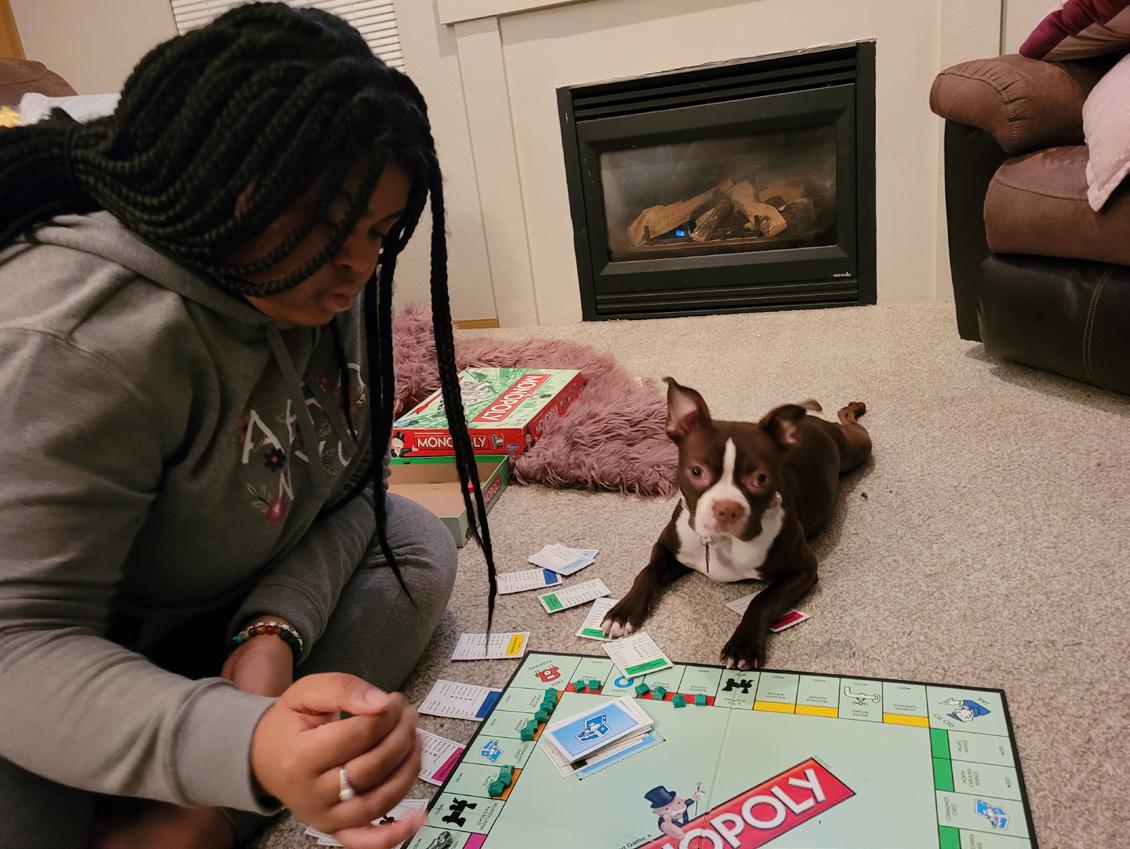


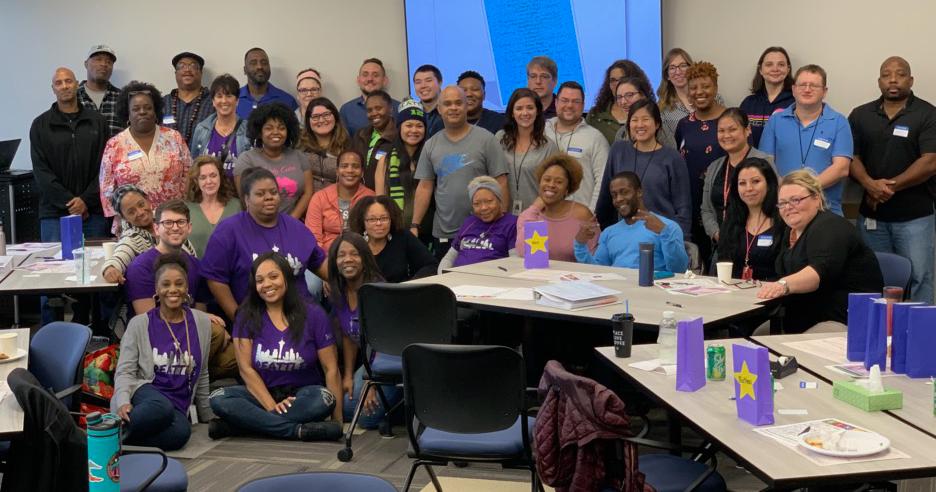
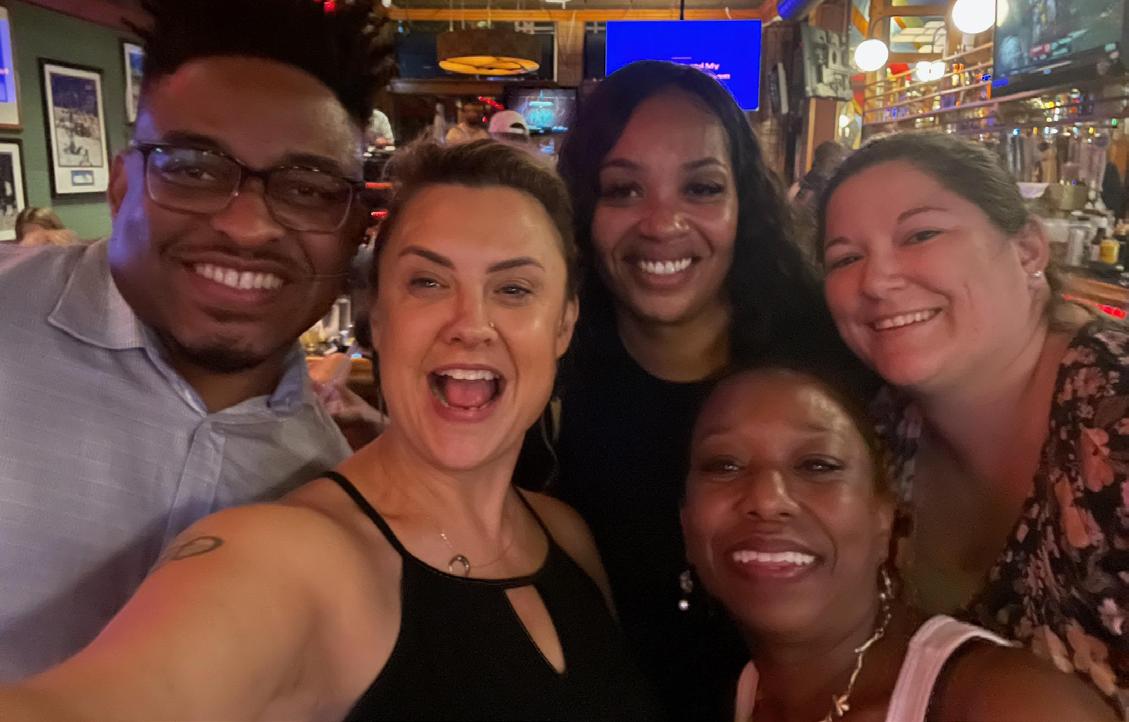
Steptoe Butte State Park near Colfax, WA

It has been a busy and exciting time for APS Policy!
The APS Policy Unit has grown! We have welcomed two new members to the team. Chasity Smith joined as the APS Policy Program Manager in March and Leslie DeMarco joined as the Mental Health Transformation Policy Program Manager in mid-May. With the expansion of our unit, we hope to improve our ability to meet staff and operational needs to ultimately better support the important work we do for vulnerable adults.
We began our second Policy Community of Practice (COP) Workgroup. The Community of Practice was inspired by staff interest with involvement creating more clarity around the development and application of policy. The goal of the Policy COP is to continue to increase staff involvement and understanding of APS policy through staff feedback and suggestions provided during the workgroup meetings and review of suggestions for policy enhancements. In addition to our Policy Team and headquarters facilitators, the group includes a variety of field staff who serve a one-year term. We have appreciated the work and accomplishments of our COP members over the past year. A special thank you to
Nattalie Cariker, Jennifer Acevedo, Valerie Nafe, Sarah Berschinski, Alyssa Powers, Lauri Esslinger, Alyssa Abel, and Lori Burdick for their participation in the 2023-2024 Policy COP! We are looking forward to continuing these efforts with our new COP cohort to better support vulnerable adults and the APS workforce!
By popular demand, staff now have access to view pending policy changes within PolicyTech. This will provide staff an opportunity to view upcoming changes prior to their publication date. We appreciate all the feedback and suggestions we received. We are excited to have implemented this request for viewing policy changes prior to publication.
• Forensic interviewing has been established in policy as the official protocol for all interviews of alleged victims. Coming in August this policy will be expanded to include alleged perpetrators. These changes can be found within Investigations: Procedures for all APS Investigations. This interview structure is an evidence-based practice that is being used across the country. Forensic interviewing provides an

objective approach to gather information using person-centered techniques to guide a thorough and thoughtful conversation. The goal is to increase quality, consistency, and confidence in interviewing.
• As of May 16, 2024, Legal Benefits Advisors (LBAs) will no longer be participating within Investigation Review Team (IRT) meetings. This change will allow APS policy to be the central focus when evaluating cases for substantiation, allowing the IRT Facilitators (program managers) to be the subject matter experts throughout the IRT process. Where additional support is needed, we now have our growing Policy Unit available to provide guidance to IRT Facilitators as needed. These changes were reflected in policy on May 13, 2024.
• Coming in August the Case Record document will be updated to include policy and procedure for saving and uploading password protected documents and executable (.exe) files received during the course of an investigation. This change is based on the need to have a clear policy and procedure for handling these documents for future access and record retention.
• Thanks to everyone who have attended the Understanding Policy Webinars. The webinars are recorded and will be placed in the Learning Center for staff who are unable to attend. The webinars are designed for staff to learn and ask questions about policy, resources, and other state programs. Stay tuned for upcoming Understanding Policy Webinars.
Stay tuned for the next topic of discussion, APS Disposition Template.
Check out the interactive feature on the APS Division main page to submit your “why” of joining APS.

